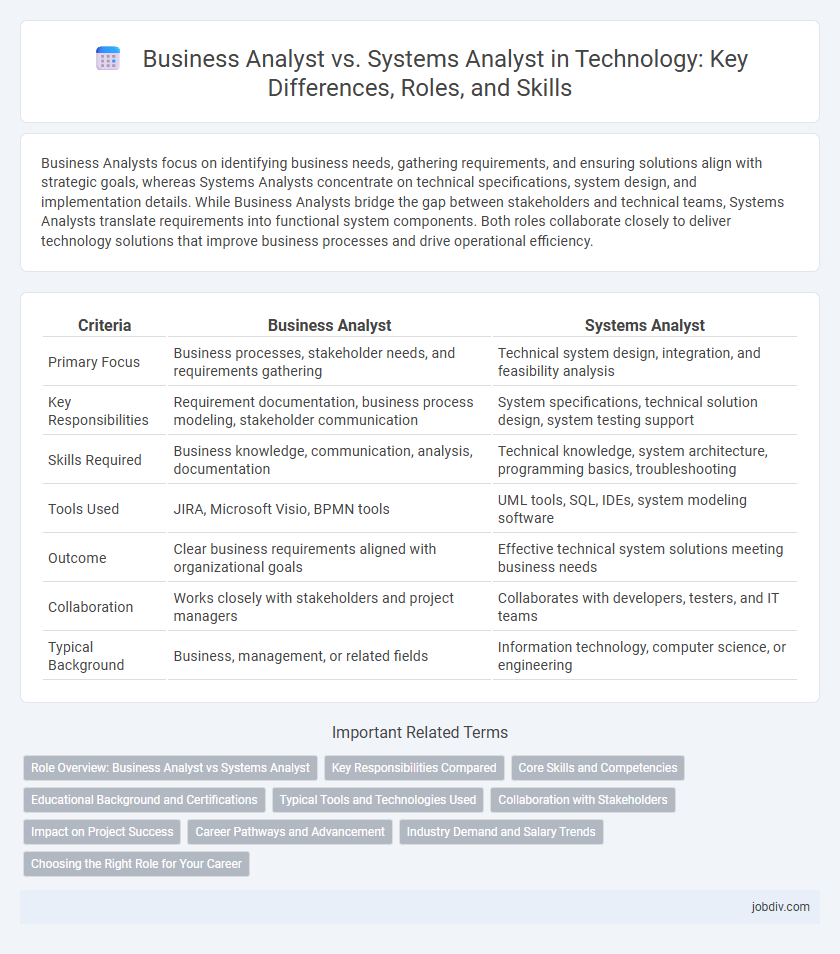Business Analysts focus on identifying business needs, gathering requirements, and ensuring solutions align with strategic goals, whereas Systems Analysts concentrate on technical specifications, system design, and implementation details. While Business Analysts bridge the gap between stakeholders and technical teams, Systems Analysts translate requirements into functional system components. Both roles collaborate closely to deliver technology solutions that improve business processes and drive operational efficiency.
Table of Comparison
| Criteria | Business Analyst | Systems Analyst |
|---|---|---|
| Primary Focus | Business processes, stakeholder needs, and requirements gathering | Technical system design, integration, and feasibility analysis |
| Key Responsibilities | Requirement documentation, business process modeling, stakeholder communication | System specifications, technical solution design, system testing support |
| Skills Required | Business knowledge, communication, analysis, documentation | Technical knowledge, system architecture, programming basics, troubleshooting |
| Tools Used | JIRA, Microsoft Visio, BPMN tools | UML tools, SQL, IDEs, system modeling software |
| Outcome | Clear business requirements aligned with organizational goals | Effective technical system solutions meeting business needs |
| Collaboration | Works closely with stakeholders and project managers | Collaborates with developers, testers, and IT teams |
| Typical Background | Business, management, or related fields | Information technology, computer science, or engineering |
Role Overview: Business Analyst vs Systems Analyst
Business Analysts primarily bridge the gap between business needs and IT solutions by gathering requirements, analyzing processes, and ensuring project objectives align with organizational goals. Systems Analysts focus on designing and optimizing IT systems, evaluating technical specifications, and collaborating with developers to implement efficient software solutions. Both roles require strong analytical skills but differ in scope, with Business Analysts emphasizing business strategy and Systems Analysts concentrating on technical system design.
Key Responsibilities Compared
Business Analysts specialize in understanding business needs, requirements gathering, and stakeholder communication to ensure project objectives align with organizational goals. Systems Analysts focus on designing, analyzing, and implementing technical solutions by evaluating system requirements and specifications. Both roles collaborate closely but differ with Business Analysts emphasizing business process improvement, while Systems Analysts target technical system design and integration.
Core Skills and Competencies
Business Analysts excel in requirement gathering, stakeholder communication, and process modeling, emphasizing understanding business needs and translating them into technical specifications. Systems Analysts specialize in technical system design, integration, and troubleshooting, focusing on aligning IT infrastructure with business goals. Both roles require strong analytical thinking, but Business Analysts prioritize business acumen while Systems Analysts emphasize technical proficiency and system architecture knowledge.
Educational Background and Certifications
Business Analysts often hold degrees in business administration, finance, or related fields, supplemented by certifications like CBAP (Certified Business Analysis Professional) to validate their expertise in requirements gathering and stakeholder communication. Systems Analysts typically possess educational backgrounds in computer science, information technology, or engineering, with certifications such as CompTIA ITF+, Microsoft Certified: Azure Fundamentals, or CSAP (Certified Systems Analyst Professional) emphasizing technical skills and system design. Both roles benefit from continuous learning, but their educational focus and credentialing paths align closely with their distinct functions in bridging business needs and technical solutions.
Typical Tools and Technologies Used
Business Analysts commonly use tools like Microsoft Excel, Microsoft Visio, and business intelligence software such as Tableau or Power BI for data visualization and requirement gathering, while Systems Analysts often utilize modeling languages like UML, CASE tools, and software development environments including IDEs and version control systems such as Git. Both roles engage with collaboration platforms like JIRA, Confluence, and SharePoint to streamline communication and project management. Familiarity with SQL and database management systems also benefits Systems Analysts in analyzing system performance and data requirements.
Collaboration with Stakeholders
Business Analysts excel in bridging communication gaps by gathering business requirements and translating them into actionable insights for stakeholders. Systems Analysts collaborate closely with technical teams to design and implement system solutions that align with stakeholder needs and business goals. Both roles prioritize stakeholder engagement to ensure project success through clear, continuous collaboration.
Impact on Project Success
Business Analysts drive project success by defining clear business requirements and aligning stakeholder goals with project objectives, ensuring solutions meet market needs. Systems Analysts enhance project outcomes through technical specifications, system design, and integration, enabling seamless implementation and functionality. Collaboration between both roles bridges business needs and technical execution, significantly increasing the likelihood of delivering successful projects on time and within budget.
Career Pathways and Advancement
Business Analysts often progress into roles such as Product Manager, Project Manager, or Consultant, leveraging their skills in stakeholder communication and business process improvement. Systems Analysts typically advance toward positions like Systems Architect, IT Manager, or Technical Lead, utilizing their expertise in system design and technical problem-solving. Career growth in both paths depends on gaining domain knowledge, certifications like CBAP or ITIL, and experience with emerging technologies.
Industry Demand and Salary Trends
Business Analysts and Systems Analysts both play pivotal roles in technology-driven projects, but industry demand favors Business Analysts due to their broader focus on business processes and stakeholder communication. According to recent salary data, Business Analysts command an average annual salary ranging from $75,000 to $110,000, while Systems Analysts typically earn between $70,000 and $100,000. Growing digital transformation efforts across sectors continue to drive strong demand and competitive compensation trends for both roles.
Choosing the Right Role for Your Career
Business Analysts focus on bridging the gap between business needs and technology solutions by analyzing requirements, facilitating communication, and improving processes, making them ideal for professionals interested in strategic planning and stakeholder collaboration. Systems Analysts specialize in evaluating and designing IT systems, emphasizing technical specifications, system integration, and troubleshooting, suited for those with strong technical skills and a focus on system infrastructure. Choosing the right role depends on your career goals, whether you prefer a business-centric position with a broader organizational impact or a technical role centered on system functionality and implementation.
Business Analyst vs Systems Analyst Infographic

 jobdiv.com
jobdiv.com